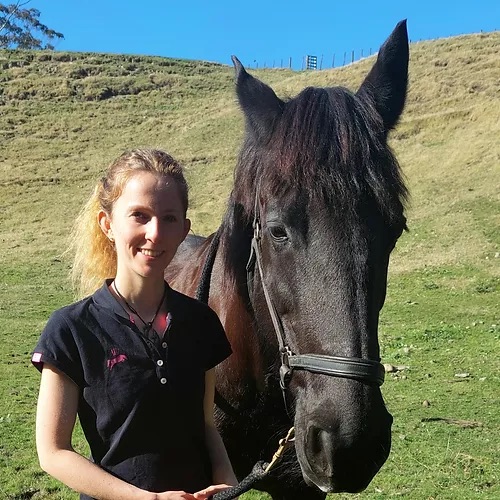testimonials
Sharron & Bobby

‘Abi treated Bobby Aug 24th and 25th for severe Lymphangitis in the whole of the near hind leg. Treatment included Pulse Mag Therapy, Massage and Kinesiology Taping on the affected limb. Abi’s care and attention to detail was second to non! The improvement in Bobby was instant and there was a clear reduction in swelling, there was also a huge improvement in circulation which I was able to feel myself. Bobby has continued to improve and without doubt Abi will be visiting again soon. I cannot recommend Abi highly enough, not only was there immediate visible and physical improvement but follow up reporting was also provided, which was very clear and detailed. Thank you Abi, fantastic.’
Phillipa Stonehouse MSc

Owner at Stonehouse Animal Rehabilitation NZ
‘I’ve seen Abi approach every animal she treats with respect and complete calm. She is brilliant at tuning in to what they need, and I wouldn’t hesitate to recommend her to anyone. Your animal will thank you!!’
F.A.Q.
There are several reasons why you animal could benefit from veterinary physiotherapy:
- Perhaps the most obvious is that your animal has sustained an injury, seen their vet and would now benefit from some treatment to promote healing and maximise recovery otherwise knows as ‘rehabilitation’. Follow these links for more information on equine conditions and canine conditions that could benefit from vet physio.
- Another common reason for physiotherapy is to maximise sporting performance and reduce risk of injury; weather this be for a competition animal or for leisure sport.
- Older animals can benefit hugely from vet physio, working to maximise comfort and mobility long term to ensure the best quality of life.
- Young animals can also benefit from physio. Addressing issues early on and promoting correct musculoskeletal and neurological development maximises sporting potential, reduces risk of injury and promotes long term health as they age.
- Vet Physio can also be useful to help put your animal back on track when they are ‘not quite feeing right’.
This all depends on what your animal is being seen for. Maintenance animals may only require a few visits a year. Rehabilitation after injury may require visits as regally as weekly or bi-weekly for a number of weeks. This will be discussed with you during or following your first session and can be discussed before hand over email, message or phone call.
If your are concerned about cost physio post-injury treatment, these can usually be claimed on insurance. At Above and Beyond Veterinary Physiotherapy we also offer a ‘Performance & Rehabilitation’ rewards package designed for those requiring more regular treatment. View our pricing and packages page for more information on the cost of treatment.
At Above and Beyond Vet Physio we believe in results! We are incredibly keen to describe and demonstrate for you the changes we see following a session as well as long term. We may perform tests, take videos, images, measurements or templates during your session so that we can monitor long and short term improvements. Following treatment you may see changes including:
- Reduced pain and discomfort
- Improved quality of movement
- Increased joint mobility and range of motion (ROM)
- Reduced muscle tension, heat and swelling
Changes shouldn’t stop at the end of a session, the exercises prescribed for you to carry out are also a vital part of your animal progression. Meaning that improvement should continue between sessions. However, it is to note that in some cases changes may be seen over a number of sessions, for example promoting nerve, tendon or muscle healing or building muscle (known as hypertrophy).
If your horse has received a light or ‘maintenance’ treatment gentle exercise within 24 hours of treatment should be fine, in fact for some cases it may be advised! In scenarios where deep tissue work has been carried out, issues such as saddle discomfort or during post-injury rehabilitation time off of exercise may be required. The exercise plan provided for your horse following their session should help advice and guide you on how to safely exercising your horse following treatment.
If you have an specific exercise based commitments in close proximity to your animals treatment let us know before hand and we will ensure you are good to go 🙂
